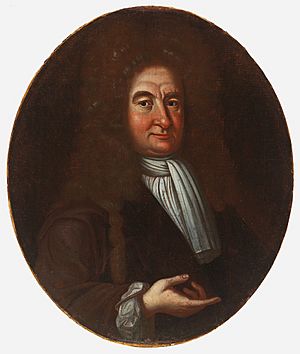Wait Winthrop facts for kids
Quick facts for kids
Wait Winthrop
|
|
|---|---|
 |
|
| Born | 27 February 1642 |
| Died | 7 November 1717 |
| Children | John Winthrop, Anne Winthrop |
| Parent(s) |
|
Waitstill Winthrop (born February 27, 1642 – died November 7, 1717) was an important leader in early New England. He served as a judge, a military officer, and a politician.
Contents
Early Life and Family
Waitstill Winthrop was born on February 27, 1642, in Boston. At the time, Boston was the capital of the Massachusetts Bay Colony. He was given the name Waitstill, but he often used the shorter name "Wait."
He was the second son of Elizabeth Reade Winthrop and John Winthrop the Younger. His father was an early governor of the Connecticut Colony. Waitstill's older brother was Fitz-John Winthrop, who became a major-general in the army. Fitz-John also served as governor of Connecticut from 1696 until his death in 1707.
Waitstill Winthrop's grandfather was John Winthrop. John Winthrop was one of the founders and first governors of the Massachusetts Bay Colony.
Public Service and Leadership
Waitstill Winthrop held many important jobs in the government of Massachusetts. He became the chief judge of the Massachusetts Superior Court. This was the highest court in the Province of Massachusetts Bay. He was also a long-time member of the council that advised the governor. He even tried to become governor himself.
Military Roles
Winthrop was a military leader during two major conflicts. He led the Massachusetts local army (militia) during King Philip's War in the 1670s. He also led them during King William's War in the 1690s. These wars were fought between English colonists and Native American tribes.
Political Views
Winthrop was a "populist" politician. This means he supported the common people. He often worked against the royal governors, especially Joseph Dudley. Winthrop wanted to bring back the first set of rules (charter) that governed Massachusetts.
Involvement in the Salem Witch Trials
In 1692, Governor Sir William Phips chose Winthrop to be one of the judges. These judges were part of a special court called the Court of Oyer and Terminer. This court heard the famous Salem witch trials. During these trials, many people were accused of witchcraft.
That same year, Winthrop joined the Military Company of Massachusetts. He was also chosen to be the captain of this company in June.
Judicial Career
When the courts in the province were reorganized, Winthrop was appointed as a judge. He became an associate justice of the Superior Court of Judicature. This was the highest court in the province.
He kept this job until the chief justice, William Stoughton, passed away. After Stoughton's death, the Governor's Council (a group of advisors) made Winthrop the chief justice. His political supporters were planning to go to London to argue for him to become governor. However, they soon learned that Joseph Dudley had already been appointed governor. Because of this, Winthrop resigned from his position as chief justice.
In 1708, Governor Dudley reappointed Winthrop to be chief justice. He held this important position until he died in 1717.
Other Interests
Besides his public duties, Winthrop had other interests. He spent time on farming and studying medicine. He often helped his neighbors with these skills.
Personal Life
Waitstill Winthrop was married twice. His first wife was Mary Browne (1656–1690). She was the daughter of William Browne. Waitstill and Mary had several children before she passed away at age thirty-four in 1690:
- John Winthrop (1681–1747): He married Ann Dudley, who was the daughter of Governor Joseph Dudley. John graduated from Harvard College in 1700. He served as a judge in Connecticut. He also became a member of the Royal Society of London. This is a famous scientific group. He wrote for their publications, and one of their books was even dedicated to him.
- Elizabeth Winthrop (1683–1683): She died as a baby.
- William Winthrop (1684–1693): He died when he was young.
- Ann Winthrop (1686–1746): She married Thomas Lechmere.
- Joseph Winthrop (1689–1693): He died in childhood.
On November 13, 1707, Winthrop married for the second time. His second wife was Katherine Eyre (1664–1725). She was the widow of John Eyre and the daughter of Captain Thomas Brattle. Katherine's brother was Thomas Brattle, a merchant who was the treasurer of Harvard College. He was also involved in the Salem Witch Trials.
Waitstill Winthrop passed away on November 7, 1717.
Family Legacy
Through his only son who survived, John Winthrop, Waitstill became the grandfather of John Still Winthrop. John Still Winthrop was the father of Thomas Lindall Winthrop (1760–1841). Thomas Lindall Winthrop later became the 13th Lieutenant Governor of Massachusetts.
 | Emma Amos |
 | Edward Mitchell Bannister |
 | Larry D. Alexander |
 | Ernie Barnes |

